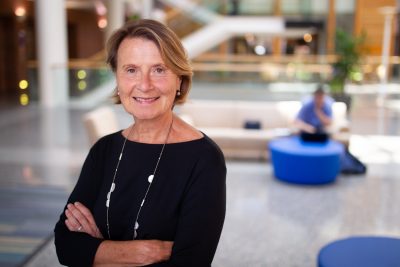Q&A with Sheila Leatherman, CBE, Honorary FRCP, MSW
How do you define humanitarian health?

Sheila Leatherman, CBE, Honorary FRCP, MSW
There are many technical definitions but I use a broad one. Currently, two billion people live in countries where development outcomes are affected by fragility, conflict, and violence (FCV). By 2030, nearly 50% of the global poor will live in such situations. The UN cites that as of 2019, 131.7 million people worldwide are in need of humanitarian aid and one in every 70 people around the world are in crisis. The 71st World Health Assembly recognized the dire need to protect one billion of the worlds’ population from health emergencies. Essentially humanitarian health applies to fragile unstable settings, affected by acute or ongoing instances of political turmoil, conflict, natural disaster, extreme austerity where there is a breakdown in authority, systems, and services to people in need.
What is the Gillings Humanitarian Health Initiative?
The Gillings Humanitarian Health Initiative to date has largely been a partnership between Research, Innovations and Global Solutions and a small group of faculty and students. Future efforts will be built on current activities and assets but further developed to increase impact. This will require a well-coordinated and multifaceted strategy including: internal efforts to grow interest and institutional capability, seek funding, strengthen partnerships and create standing capacity to provide service and support through faculty and student participation. Activities will include technical support to countries and NGOs through service projects, internships, action research, advocacy, awareness building and education. We aspire to have impact on improving the health and well-being of the lives of those suffering from humanitarian crises. Realistically, we will only do so by carefully selecting those with whom we partner (donors, NGOs, multilaterals, etc.); focal countries where we develop contextual expertise and where our partners have presence; the problems and issues where we bring expertise and capacity to translate research into practice
How has the current COVID-19 pandemic impacted humanitarian health?
Like many other questions regarding COVID, we don’t yet know the answers, but early indications are grim. A recent UN Panel report (July 2020) estimates that negative impacts resulting from COVID-19 will include 5.3 million deaths in children under five, over 400,000 additional deaths due to COVID-19-related disruptions in services, vaccine shortages in 20 countries, disruptions to contraceptive supplies resulting in 15 million unintended pregnancies and 42-66 million more children at risk of falling into extreme poverty.
What initially sparked your interest in public health and humanitarian health?
I have always believed health is a human right. Having that fundamental belief makes public health the natural pathway. Though working in the US in my early career, I yearned to work elsewhere in the world where that belief and value was a given and we could focus only on how to accomplish it not argue about who deserves access to health services. So, in 1995 I chose to focus my work outside the US. Having worked in many countries around the world, it became obvious to me that humanitarian settings have the greatest need and the most critical gaps.
In 2007, Queen Elizabeth II honored you as a Commander of the British Empire (CBE). Will you tell us more about that experience?
I worked in the UK for 20 years as an independent evaluator of the quality of care provided by the NHS. My work was supported by foundations but I worked very closely with the UK government and the NHS leadership to identify major issues related to quality and safety of health services as well as to design and monitor interventions for improvement. The NHS made tremendous strides in access, effectiveness, equity, patient satisfaction and importantly, actual outcomes of care such as reducing avoidable deaths. I have tremendous respect and fondness for the National Health Service. It is not perfect, but it does perform well given the funding levels, the aged infrastructure and the huge responsibilities it holds for comprehensive health and wellbeing in the UK.
When you are not working, how do you like to spend your time?
Hard as it may be to believe, given how much I am out of the country for work, on my free time I like to travel. I am truly an itinerant with an insatiable curiosity to see the world.
